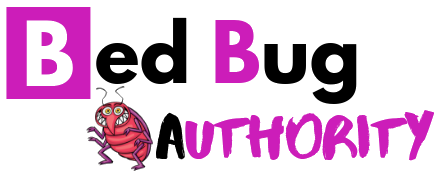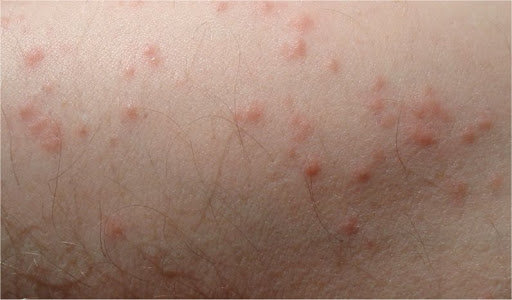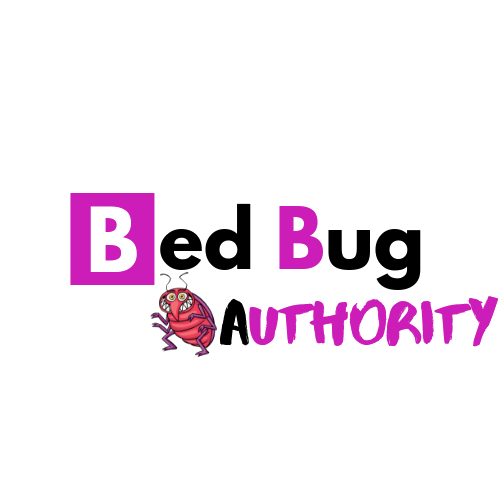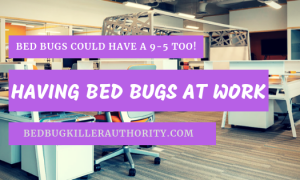So you think you have bed bugs?
Do you have rashes on your body that you didn’t have before you went to bed, the night before?
Today we will show you how to identify a bed bug and the allergic reactions for to their bites and the symptoms that come from this pesky little bloodsucker.
I won’t lie to you: There’s nothing pretty about bed bugs. But with the increased news coverage they’ve received of late, we thought we might shed a little light on why you should be worried, above and beyond the creepiness factor.
Bed bugs absolutely need to bite you – the blood of warm-blooded animals like yourself are their only form of nutrition. So if you’re living with bed bugs, you will get bitten. And yes, bed bug bites suck – literally. You see, bed bugs don’t technically bite – they suck by using two little tubes for their feeding. One is used to inject an anti-coagulant along with their anesthetic saliva into the bite area while they suck your blood with the other tube. Everybody reacts differently to bed bug bites.
I spoke to customers that had a heavy infestation and they didn’t have a mark on them, the only reason they knew they had bed bugs was that they actually saw the bugs. Now that’s a heavy infestation when you can actually see the bed bugs. Other customers had a lite infestation or at the beginning stages and they were covered with bites.
Even if you do not suffer a bed bug allergy after getting bitten by bed bugs, swelling and blisters can result from scratching the bites. So, there is no telling how your body will react to their bite until you get bitten. It is estimated that 40% of people that are bitten don’t show any allergic reaction.
Here we have some home remedies that you can try to eliminate these nasty bugs. Some I have tried and others I have been told by customers, friends, and family. Some have worked but, some haven’t and I believe it is all in the application.
You can also try out some natural insecticides to get rid of the bed bugs and their eggs. In this regard, plant essential oils have gained importance as a significant natural source of pesticides. They represent a market estimated at $700 million. The total production of essential oils in the world is estimated to be around 45000 tons.
Most essential oils affect the inner cell membranes of insects, causing cytotoxic effects. It is this property that proves beneficial when tackling any kind of bug or insect infestation. And while the essential oils are toxic to the bugs, they are safe for humans. Here we look at some essential oil-based natural insecticides as well as some other less harmful repellents to help get rid of bed bugs.
Tea Tree Oil Spray
Studies show that tea tree oil is an effective insecticidal. The essential oil of the tea tree effectively disrupts the permeability barrier of cell membrane structures, thus resulting in the loss of chemiosmotic control and fatality.
It is this membrane-damaging property of tea tree oil that makes it an effective natural insecticide in fighting bed bugs. You can use the homemade spray in hard-to-reach places, like cracks, crevices, and furniture joints.
:: To make a natural insecticide with tea tree oil, mix two teaspoons of tea tree oil with 50 ml of water. Pour it into a spray bottle and shake well. Spray liberal amounts of the natural insecticide in all areas where you think bed bugs are living. Use this application daily until all the signs of bed bugs have disappeared. Remember to shake well before each application.
Lavender Oil
Like tea tree oil, the lavender essential oil can also be used as an effective natural insecticide to kill bed bugs. Lavender oil is also believed to destroy bed bug eggs as well. It is also said that it is the smell of lavender that kills the bugs. However, the oil probably acts as a cytotoxin and thus kills the bed bugs.
:: To make a spray, mix 10–15 drops of lavender oil with 50 ml water. Shake well, pour into a spray bottle, and use it in areas where the infestation is seen. You can also use lavender soap or powder as a spray. Another method is to place fresh lavender leaves or flowers in and around the infested areas to get rid of the bed bugs.
A combination of lavender oil and peppermint oil was also found to be highly beneficial in exterminating bed bugs.
:: Add 10–15 drops of lavender essential oil and 10–15 drops of peppermint oil into a spray bottle. Fill it with water. Then shake well and spray in affected areas.
Citronella Spray
Citronella, or lemongrass as it is more commonly known, is another essential oil that can repel and kill bed bugs as well as its eggs. Citronella oil is believed to increase the acidic condition within the bugs, thus effectively eliminating it. Like lavender, the smell of citronella is also believed to help get rid of bed bugs.
:: Add 10 drops of citronella oil to a small bowl of water. Pour it into a spray bottle, shake thoroughly, and spray in affected areas to get the best results.
Eucalyptus Oil Spray
The evergreen, mighty trees of the eucalyptus can be seen in most places across the world. The essential oil found in its foliage is widely used in food, pharmaceuticals, perfumes, etc. It is also used extensively as an insect repellent.
Eucalyptus is believed to exhibit ovicidal activity, as well as insect repellency against bacteria, fungi, insects, weeds, nematodes, and mites.
:: To make the spray, take two ounces of water, 1.5 ounces of witch hazel or vodka, and 30 drops of eucalyptus essential oil. Pour all this into a spray bottle and shake well to mix it. Then spray the solution on the affected areas. Repeat the spraying every two hours or so.
Essential Oils Of Orange
Orange oil contains d-limonene which is classified as an insecticide. This is a nerve toxin that kills the bugs and insects within minutes of contact.
:: Make a spray solution by mixing 1 cup of compost tea, 1 ounce of blackstrap molasses, and 2 ounces of orange essential oil in 4 liters of water. Mix all this together well and spray in the affected areas.
Neem Oil
For a long time, neem oil has been used for various medicinal and insecticidal properties. This has been passed down from generations. The tree, the leaf, the seeds are all used for medicinal purposes with beneficial results. Studies show that neem oil, especially cold-pressed neem oil, has high toxicity, and antifeedant and can repel a number of pests. It was also shown to have high larval growth inhibition properties.
:: To make a spray solution, add 1 ounce of concentrated neem essential oil to 4 ounces of water. Add ½ teaspoon of soap in order to emulsify the solution. Mix it well. Then spray and wipe down beds, sheets, walls, crevices, and all other potential bed bug hiding places. Do this three times a day for the first three days. Then shift to treating your home every alternate day for a total of 18 days.
Sweet Flag
Sweet flag or Acorus calamus, is an uncommon, semi-aquatic, perennial plant found in Eurasia and the Americas. Valued for its rhizome and fragrant oils, this plant has been used medicinally as well as for its insecticidal properties, since time immemorial.
Recent studies have also revealed that the sweet plant possesses antifungal and antibacterial properties. The antimicrobial property makes the sweet flag effective against bed bugs.
:: To make a spray, boil 100 grams of sweet flag and 50 grams of turmeric powder in one liter of water. Boil this for an hour. Then keep the solution in a closed container for 24 hours. The next day, filter and dilute the solution in 10 times the water. Transfer to a spray bottle and spray lavishly in affected areas and its surroundings.
Bean Leaves
Did you just think “folklore” when you read the word kidney beans? Well, push that thought aside. Studies have shown that the leaves have microscopic hairs called trichomes on its surface that entangle the bugs onto it, literally stopping them in their tracks. Unlike a Velcro effect, the trichomes actually get hooked onto bugs’ legs, trapping them.
:: Scatter kidney bean leaves all over the house, especially in infested areas. You can also place the leaves under mattresses. You can either wait for a couple of days before getting rid of these leaves or opt to use fresh leaves every day for a few days. Since the bugs are stuck on the leaves, getting rid of the leaves will ensure the bugs never return.
Thyme
Thyme oil or thymol concentrate is effective bed bug repellents. They are also shown to be effective deterrents for egg-laying by mites.
:: You can tie a thyme stick with a cotton cloth and burn it near the infested area, or in the infested room. Alternatively, place thyme leaves in net bags and place them in and around the infested areas. Remember to replace these bags with fresh leaves every third day. Continue the process for up to a month to ensure all bed bugs have been killed.
Clove
Like most other essential oils, clove oil to possess insecticidal and insect repellent properties. It is believed that the acidic pH of cloves, as well as its pungent smell, disturbs the survival of the bugs, thus destroying them.
:: Mix 1 teaspoon clove essential oil with 1 cup water. Pour into a spray bottle, shake well, and spray in affected areas.
Diatomaceous Earth
Diatomaceous earth (DE) is a non-toxic insecticide that is used for the protection of stored products and to control pests in the home and garden. It is a natural product that harms neither the earth nor the people.
It can be conveniently used in any space, even crevices on walls and other inaccessible regions. DE comes as a fine crystalline powder. Fine for the human eye, but the crystals trap and tear up the bed bugs.
:: Spray or sprinkle food grade DE on the bed, the floor, the crevices, and other areas where bugs are likely to hide. Let it stay for up to three days. After three days, vacuum or broom up the entire house. Some other products that work effectively against bed bugs are baking powder and boric powder. While the boric powder is toxic, baking powder is harmless for humans.
Also, remember that most essential oils should be effective in getting rid of bed bugs. This is because, as mentioned, the oils function as cytotoxins, destroying the membranes of the bugs. So, go ahead, get started on ridding your home and hearth of those pesky bloodsuckers.
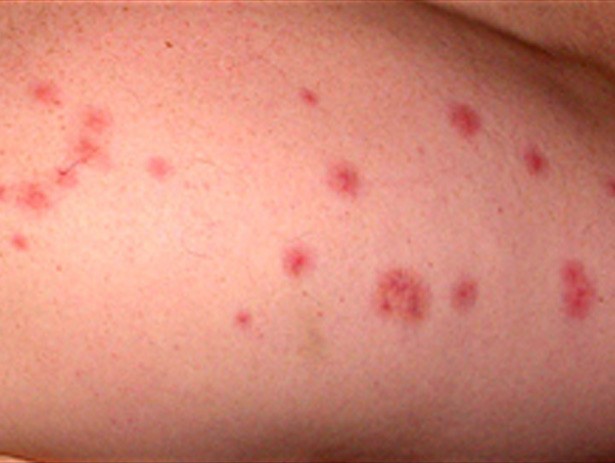
Bed Bug Allergy Remedies
There is no specific medical treatment just for bed bug bites. For severe itching, a doctor can prescribe a stronger corticosteroid. Antihistamines help as well, but there are many types so your dermatologist will have to determine which one is the best in your situation.
Bed bug bites should be treated professionally if you have many of them or blisters develop. A pussy discharge may indicate an infection or a large and/or growing area of swelling, hives, and red skin can form. These symptoms could indicate an infection or allergy. A physician will go about treating the condition based on your symptoms.
Infections: A small skin infection can snowball into something worse if nothing is done about it. You might need an antibiotic. Dermatologists prescribe antibiotics or, for a mild infection, an antiseptic you can just rub on the affected skin. Antiseptics don’t always need a prescription, however. They can help prevent infections in many cases.
Allergic Reaction: Severe reactions such as swelling, excess redness, severe itching, fever, etc. require immediate injections. Some medications used in these instances include corticosteroids, epinephrine, or antihistamines. Below are some home remedies you can try for alleviating the itching of the bed bug bites.
For mild bed bugs allergic reactions like itching, slight swelling, and rashes, you can use the following methods to alleviate the discomfort:
Hydrocortisone Creams
Lower strength hydrocortisone creams can be bought over the counter at most pharmacies and will often help reduce swelling and reduce itchiness. If you don’t see specific hydrocortisone creams, then look for other anti-itch creams as they will often contain some hydrocortisone.
If the bed bug bites are very itchy, then visit your doctor and see if they can prescribe you a stronger hydrocortisone cream.
Antihistamines
There are a variety of different antihistamines – some you take orally while others you apply topically. Also, if you need to drive or operate machinery, watch out for some antihistamines that can cause drowsiness.
These antihistamines work by reducing the histamine levels in your body. When you get bitten by bed bugs, they inject a chemical into your skin and your body senses it as a foreign object and starts producing histamines to combat it. That’s why there’s swelling. The antihistamines will call off your body’s responses and return things to normal again.
Calamine Lotion
Calamine is a cream you can apply to the bites to help keep the itching down. It’s used often to calm a variety of bug bites.
Washing with Soap
This is an easy first step if you’ve gotten bitten by bed bugs. It’s mostly good for reducing the initial itchiness and killing the bacteria that might be around the bite to prevent the bites getting infected.
Baking Soda
Many people find creating a paste using baking soda and a small amount of water and applying it on your bites helps with calming itchiness. This is a simple solution to try since most of us have baking soda at home.
Essential Oils
Essential oils like tea tree and lavender often help with the bites. Both have properties that can help with itchiness. However, as with all essential oils, make sure you buy pure ones and dilute properly before apply to your skin.
Epsom Salt Baths
You can buy these salts in a variety of stores and they at worst can provide you with a nice relaxing bath. Epsom salts contain magnesium, which can help you sleep better. So, this is a great way to soothe your bites and help you get a good night’s sleep.
Some of these bed bug allergy cures can help calm the itchiness and reduce the swelling, you really want to make sure you cure your bed bug problem so that you don’t keep getting more bites. The rashes are the reaction of the bite and you can soothe and alleviate the bites and rashes but, we have to get to the root of the problem and get rid of the bed bugs for good. Here are some quick facts about bed bugs so, you can be informed about this pesky little bloodsucker.
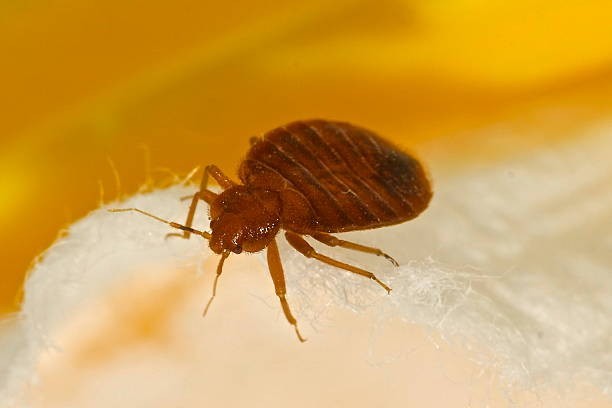
BED BUGS ARE PARASITES
Bed bugs live off the blood of their prey, much the way mosquitoes do. They come out mostly at night and get into beds, typically crawling onto legs and feet to bite and feed. Although most people are not allergic to them, their bites can leave red marks that itch and cause discomfort.
For small children who live in a home with an infestation, they may lose significant blood, especially if they already suffer from anemia. Most bed bugs feed for 3–15 minutes every 3–4 days.
BED BUGS CARRY DISEASES
Unlike mosquitoes that are known to carry dangerous diseases from person to person when sucking blood from their hosts, bed bugs don’t have the ability to share those blood-borne diseases.
According to a recent study, nearly 30 diseases have been found in them, including everything from viruses and bacteria to protozoa and parasitic worms.
Thankfully, there have been no proven cases in which bed bugs have transferred diseases between hosts, so they are much less dangerous than mosquitoes in this way.
BED BUGS REPRODUCE QUICKLY
A bed bug that is well-fed can lay up to 500 eggs in her lifetime. While that fact alone is not dangerous to human health, it’s the fact that the bed bugs multiply — in large numbers — that makes getting rid of them that much more of a challenge.
While most bed bugs don’t travel once they’ve set up residence, they certainly can attach themselves to luggage or clothing, and they can lay eggs in those locations as well, meaning they can spread quickly.
So, let us remember that bed bugs are no joke. This can really be a costly problem if they go undetected and left to reproduce. The problem can get as big as having the whole house heat-treated and that can be really expensive but, if we can catch them at the early stages they can be eradicated. We must pay attention and be vigilant.
